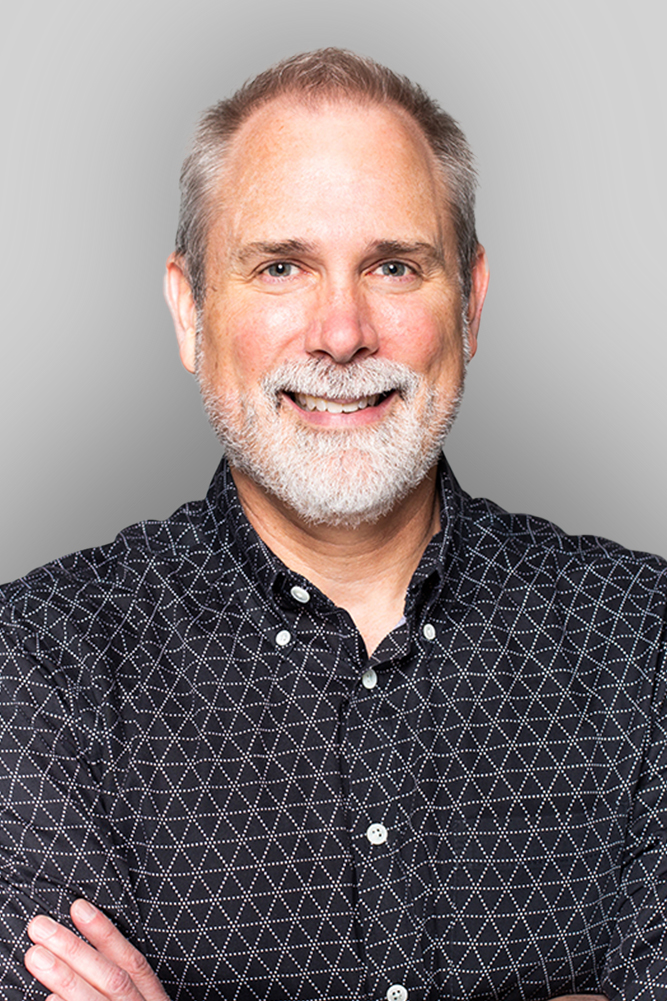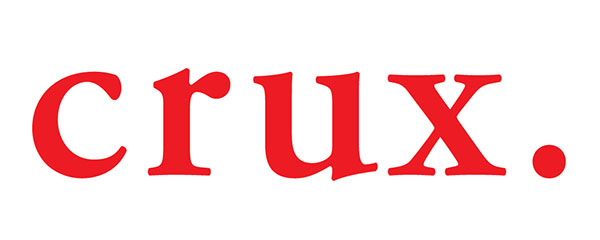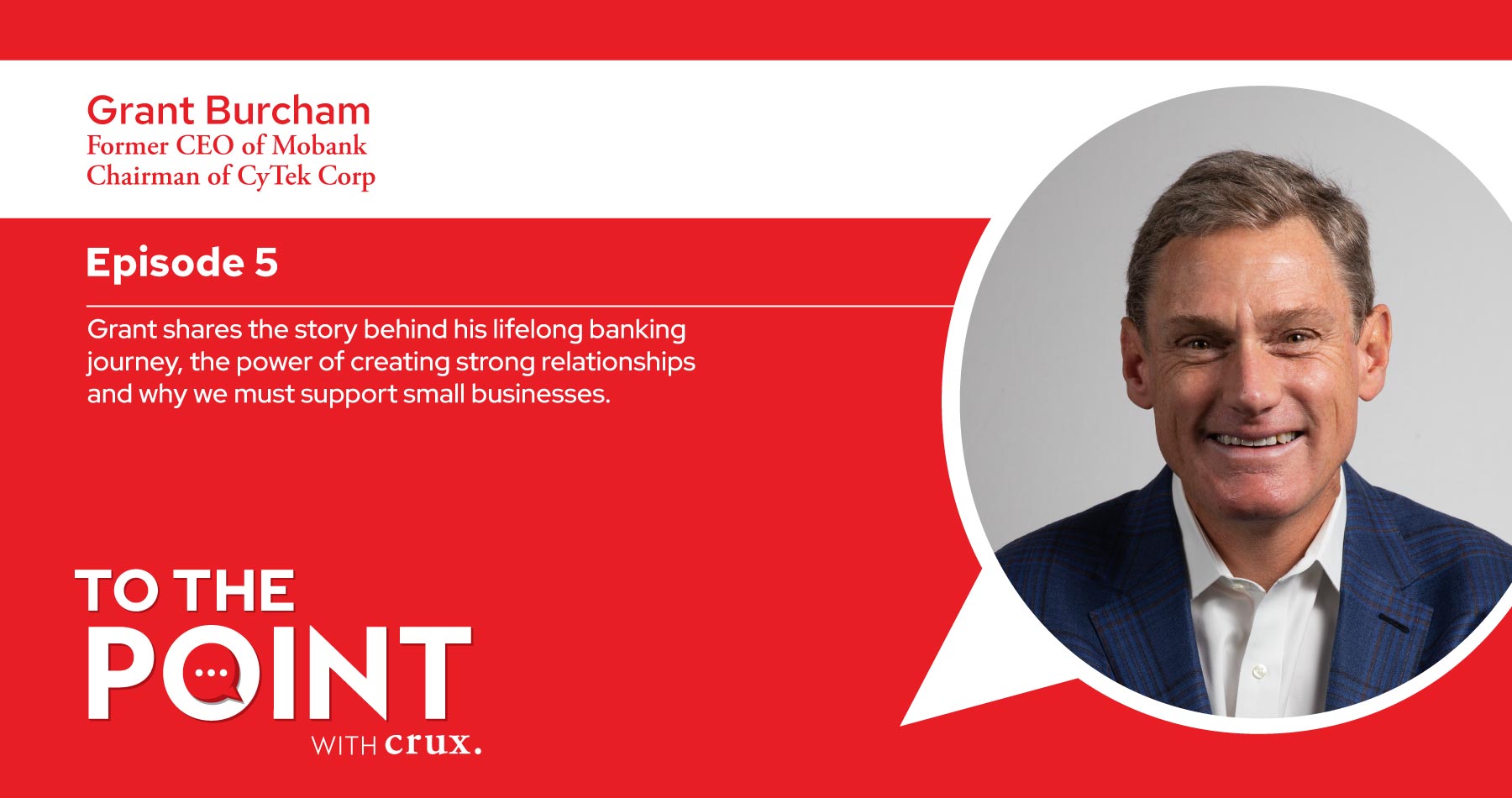For our fifth episode, President & CCO Ethan Whitehill chats with Grant Burcham, the Former CEO at MoBank and Chairman at CyTek Corp. Grant breaks down his lifelong banking journey, discussing the power of relationships and the significance of small businesses. He also explains his involvement with CyTek Corp and what makes them unique in IT.
Get to the point with us on the last Tuesday of each month!
Episode Transcript
Ethan Whitehill: Welcome to our podcast. I’m Ethan Whitehill, President, and Chief Creative Officer at Crux, the un-agency that fuels business growth. Here on “To The Point”, we get to the point with entrepreneurs and marketers who have transformed organizations by elevating brands and amplifying missions. My guest today is Grant Burcham, a lifelong banker who took Missouri Bank to Mobank, growing assets from $15 million when he started to more than $600 million when he sold to BOK Financial in 2016. Under his leadership, Burcham’s bank focused on small businesses. He understood small business owners because he was one and I should mention, Mobank was the KC Chamber’s Small Business of the year in 1999.
Grant let’s start here. How did you get your start in the banking industry?
Grant Burcham: I got my start in the banking industry because there was a job available and in 1984 there weren’t a lot of jobs available in any industry. So, I applied to several different jobs around the middle part of the country and ended up at Mobank. It was Missouri Bank and Trust Company of Kansas City at the time.
Ethan Whitehill: And what made Mo Bank stand out to you?
Grant Burcham: It was a job and so what I learned, my first job there was in the bookkeeping department counting checks.
So literally, you may not remember this, but you used to get all your checks back in the mail every day . And my job was to count the checks to make sure that the right number of checks were going back to the customer.
Ethan Whitehill: So, was there a specific moment while you were counting checks when you said, I’m going to run this place someday?
Grant Burcham: Uh, no. There was a specific moment when I thought, I don’t want to do this the rest of my life. Count checks. And so really what I learned there, we were really small. We had very few resources. We had one location downtown Kansas City at a time that downtown Kansas City was literally dead . There was nothing going on, no drive-through and no ATM .
And so, what I learned is that in order for us to succeed, we had to differentiate. It just wasn’t good enough to go toe-to-to e with any bank in Kansas City, especially since we had two of the largest banks in Kansas City on either side of us. We had to do it differently.
Ethan Whitehill: What did to you, what did different look like compared to the status quo in the industry?
Grant Burcham: Sure. So, really what it meant was a response time. It was creativity. It was looking where all the other banks were going with their strategy. We always used to say, if they’re going right, we’re going left, they’re going left, we’re going right. Trying to try to create opportunity for our team and the bank.
Ethan Whitehill: And just as a former client of Mo Bank. One thing I’ve always noticed was the culture, and I think you built the brand largely through culture, and I’d love to hear more about that.
Grant Burcham: Sure. We, out of necessity, given the lack of resources that we had, we really had to trust our team, I think the culture was built out of trust, out of respect. We always felt that of all the things that were important to us, a mutual respect amongst the team was one of the biggest. And to me that meant, in my role as CEO and Chairman, I was no more important, than our wire clerk or our bookkeeper because all of us collectively work together to deliver to the client. The beauty of the banking business, is that you see thousands and thousands of real-life case studies of business, and they’re done thousands and thousands of ways. It’s service businesses, it’s manufacturing, it’s capital- intensive businesses, it’s recurring revenue businesses.
So, what you can do if you’re a banker that thinks that way you can cobble together best practices from a wide variety of non-bank businesses, Southwest Airlines, back in the day, and you can apply them to your business. We did that. We made a habit of doing case studies on businesses outside of our industry.
Ethan Whitehill: And applied that to your own business. For other businesses, were there any common denominators that you found related to growth? Like the successful ones had certain things going for them. What were those elements?
Grant Burcham: I think it was always, being customer-centric, and then having a good culture internally.
Because obviously the customer, being customer centric, is really important. But what oftentimes gets missed in that is if you don’t have a good internal culture, you have excessive turnover, which it kind of plays on each other. It contributes to poor customer experience. So those companies that were really focused on the customer were the ones that won time and time again.
Ethan Whitehill: That’s so true. Yeah, you see it every day in your own experience, whether it’s a consumer or whatever, but it also sort of begs the question, if you don’t have a great culture, you can’t snap your fingers and create one. You know, you mentioned earlier that you model it, and you show that behavior from the top, but how else can you develop a good culture?
Grant Burcham: Yeah, I think that’s really a good question because a lot of times a manager or a business owner doesn’t know what a good culture is, so their only input is from their experience. I think you have to be really deliberate about training the culture, about digging into the details of the culture, mutual respect, delegation with trust, humor, the ability to be transparent about failings and successes.
All of those things have to be, you just can’t assume that, say a new manager that you bring in, in today’s banking business. You go on tours of businesses a lot, right? So, I would go on plant tours and office tours, and it was really interesting to see the owners and the CEOs and how they dealt with their team.
Another one, you go through a hundred thousand square foot manufacturing plant, and they (owners) would talk to every single person and have a personal antidote about their life, about their kids. They just have relationships. So those were two very different ways to run a business and it was always really interesting to me and actually played a part in the credit decision. How well I felt how cohesive the team was.
Ethan Whitehill: In that employee-centric culture. It translates somewhat to a customer-centric culture. You want people to see it, but sometimes you need to give a little boost to it and marketing comes into play.
I think that’s one thing that stands out to me about Mobank as well, is you had a very different sort of approach and, and sort of take on marketing. Maybe you could talk about that.
Grant Burcham: We really felt that we needed to go back to that differentiation that I talked about earlier. Marketing was key for us to differentiate ourselves from our competitors.
And if you just look at the landscape of bank marketing, it wasn’t really hard to differentiate, but because all the other banks are the same generally and how they market product-based marketing. It was really easy for us to have a huge impact with differentiation by market. Our personality, our irreverence, our creativity, our diverse customer base.
We typically would let our customers do the talking and we never sold products with our marketing.
Ethan Whitehill: That sort of attitude and that brand that you were developing, it also came through in the physical spaces that you created. You created some pretty unique branches. What inspired that?
Grant Burcham: It was really a function of the neighborhoods that we were in, but also back to differentiation. So, a bank branch is a bank branch in any city in the country, and people are trying to change that today. You see that with the Capital One Cafe. But we were doing it 25 years ago because we knew that our customer base would appreciate an environment that was not a traditional banking environment, both in how we treated them, but also in the physical spaces where we did business. They were open, they were largely considered more like an art gallery than a bank.
Ethan Whitehill: So, just thinking about, the business landscape you see today, as you said, you guys were ahead of the curve in your industry. I’m going to say that you are kind of a visionary. You’re looking ahead. What are some things you see on the horizon?
What are you noticing about the business climate today?
Grant Burcham: Sure. I think the business climate is the perception of the business. The climate is largely influenced by things that aren’t necessarily realistic. There’s a wet blanket that gets laid on the economy, on the future of business, say in the next 12-to-18-months. I think it’s a very different story than what we see day in and day out in business. I think things are a little brighter than you read.
Ethan Whitehill: You’ve weathered some of these cycles and you’ve seen all your clients go through it too. So, kind of when the headwinds are coming, you know, what do you recommend, from a next move perspective, with small businesses?
Grant Burcham: Sure. I think the biggest thing a small business can do is to think through the scenarios, to take the time to say, okay, what if our sales drop? What if we have to be reactive instead of proactive in the next 12 months because of things outside of our control? And if you just have a game plan for two or three scenarios, best case, middle case, worst case, then it makes it a lot easier to react to something outside of your control.
Ethan Whitehill: So, you’ve taken all this wisdom that you’ve accumulated through all these relationships and through business, and you’ve applied that to your own investing strategy and small business.
One of those businesses you recently invested in was CyTek. Tell us a little bit about CyTek.
Grant Burcham: So CyTek is a small to medium-sized business provider of IT services, security, and support. It’s been in business for 25 years.. We bought the company, two years ago this May. I love that business because clearly, it’s a growth business.
Every business in Kansas City needs what we provide and what we sell. But also, what I like about it is it’s a really fragmented industry. I know lots and lots of business owners, I talk to a lot of them about whom you use for IT security and support, and I’ve never heard the same name twice.
And so, what that means to me is opportunity. The company we bought it from was a longtime Mobank customer. The timing was right, and it’s been great.
Ethan Whitehill: You also invested in another little company called Crux. What led you to that decision?
Grant Burcham: Same thing. If you think about differentiation, what I saw in Crux was a strong leader with a very differentiated business model that played exactly to the small to medium sized business market where I have built my career.
So, in dealing with small to medium sized businesses, I understood the power of fractional marketing and the need for it without the overhead that comes from hiring your own folks. So, it just made great sense, great growth trajectory, unlimited market, great leader.
Ethan Whitehill: Shifting hats from investor to mentor and advisor.
You do a great job at that. I think you’re able to apply everything that you’ve learned over your career, and you can convey that in a pretty subtle way, which I appreciate. So, people kind of self-discover what they need to discover. Talk about that a little bit just at your stage of life and being a mentor. What does that mean and how important is that?
Grant Burcham: Yeah, it’s probably the most rewarding thing, other than family that I do these days is to, is to work with Ryan at CyTek and Melea here (at Crux) and others, such as my son and his business, to help them think through challenges and problems. Because oftentimes, you can get in the weeds, and you can’t step out of it.
I always tell everybody, you know, you’re too busy cutting down the tree to sharpen the saw. So, what we try to do, what I try to do is help people step out of the day-to-day and to look at their business from the outside in.
Ethan Whitehill: That’s great. And, and I think that’s one of the things that makes Kansas City unique. I think there’s a real mentor culture here that is fueling a lot of our small business growth today. So, thank you for that.
Going less serious on the questions now, we are now to my random 20 questions. I’m gonna roll this 20-sided dice and whatever comes up, I don’t know what it’s going to be.
You gotta be game to answer. Okay. You got it. What do we get?
Grant Burcham: Nine.
Ethan Whitehill: Let’s see. That is a nine. Oh, this is a good one. We’ve asked this one before. What is the best concert you’ve ever been to?
Grant Burcham: So, New Orleans Jazz Festival, probably 10 years ago. Elton John.
Ethan Whitehill: Elton John?
Grant Burcham: Yes, from 20 feet.
Ethan Whitehill: Oh my gosh.
Grant Burcham: Yeah, spectacular.
Ethan Whitehill: Do you remember the one song that…
Grant Burcham: You know, he has got so many great songs? Yeah. I don’t remember a specific song, but in the New Orleans Jazz Festival, if you haven’t been, it’s just fantastic. There are five stages going at once. It’s just like you would envision any of the big giant, festivals in the past that, you know, it was really, it was great.
Ethan Whitehill: Thank you for that memory. I appreciate that. Last but not least, if folks want to learn more about CyTek since we talked about them, where do they need to go for that?
Grant Burcham: www.CyTekCorp.com.
Ethan Whitehill: Fantastic. Grant, thank you so much.
Grant Burcham: Thanks Ethan. Appreciate it.
Hosted by Ethan Whitehill
 Ethan has made a career out of building agencies and growing brands. He founded the firm Two West in 1997, running it as an independent shop for nearly 20 years before combining his firm with an AdAge Top 100 Agency, where he served as CMO. As an agency founder and entrepreneur, Ethan brings a business owner’s mindset to marketing, working on a host of diverse brands, from packaged goods and professional services to hospitality and healthcare.
Ethan has made a career out of building agencies and growing brands. He founded the firm Two West in 1997, running it as an independent shop for nearly 20 years before combining his firm with an AdAge Top 100 Agency, where he served as CMO. As an agency founder and entrepreneur, Ethan brings a business owner’s mindset to marketing, working on a host of diverse brands, from packaged goods and professional services to hospitality and healthcare.


